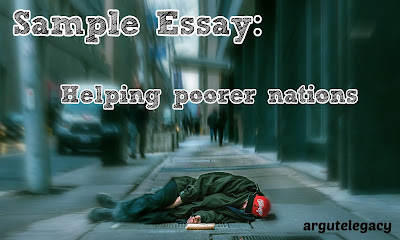In the minds of ESL exam candidates, e ssay writing is one of the most daunting tasks they are required to complete, regardless of the level of the exam, the administering body or the ease with which they themselves use the language. The same applies to students who are asked to write an essay by their teachers at school. In the previous sample essays posted on the blog, the main point I stress is the need to become acquainted with this form of writing (as opposed to writing a letter, review or report, for instance), to get a feel of what authorial voice is and how to organize and progressively express the arguments you wish to make in a coherent manner. Unfortunately, the best way to prepare for exam writing or learn how to write good essays for school is to read as many essays from as many sources as possible, then write as
Writing at C2 level
(Proficient User) on English language examinations is the same no matter the
awarding body when it comes to writing essays. If you are a candidate giving an
exam in English (IELTS, CPE, ECPE, CELP, LRN, ESB, TOEFL), make sure you read
my earlier post What do I do with the sample writing found on this blog? to get the most out of the sample essays provided on Argute
Legacy.
The topic of this essay is to say to what extent
you agree or disagree with the idea that richer nations should take more responsibility when it comes to helping poorer nations develop in terms of health, education and trade.
If you are not taking an exam
but need to discuss this topic, then read on and note down what you deem
useful. If you intend to use this essay as part of an assignment, remember to
paraphrase so as not to plagiarize.
The topic is similar to what candidates expect
in any other C2-level examination in that examiners want to see a well-organized,
coherent and cohesive discussion of the issue with arguments and examples
written in approximately half an hour. Whether or not you agree with the
viewpoint expressed, remember that what yields a higher score is the way a
subject is argued, so if you see that you come up with more ideas for the side
of the argument you disagree with during the brainstorming phase, it doesn't
matter -- simply go ahead and plead that side of the argument.
For those who'd like to read more sample essays and useful essay-writing posts, click on the image below.
Improvements in health, education and trade are
essential for the development of poorer nations. However, the governments of
richer nations should take more responsibility for helping the poorer nations
in such areas. To what extent do you agree or disagree with this opinion?
The responsibility of a government towards the
people of the country it rules has always been an issue of controversy. Sectors
such as health, education, and industrial funding, which are the cornerstones
of a nation’s overall development, should be the government’s main concerns.
Yet, poor countries are incapable of providing their citizens with such basic
needs, or so many advocate, and it becomes the responsibility of wealthier
nations to fend for these financially weaker countries. Though it may sound harsh, this is not my opinion.
By law, a government is voted by the citizens of a
country in order to take care of matters such as health, education and
development. Each country has its own problems to overcome and
must provide its people with a better standard of living, even if that standard
is higher in some countries than in others. Ethically, there is no doubt that wealthier nations should provide help, but legally no country is obligated to reach out. How would the citizens of one country feel if resources were to be diverted to other nations, when they themselves expect to reap the rewards they feel they have struggled to obtain? Aren't there enough problems in one's home country that need concentrated effort? Even the wealthiest of nations have an unemployment rate these days that puts millions below the poverty threshold. How would these citizens feel if they see government officials turn their attention abroad before addressing domestic affairs?
The difficulty is especially clear in nations with corrupt governments that do
not budget or distribute the wealth of the nation evenly and justly. Even
though other countries send aid in terms of money or supplies, the rulers of
such corrupt countries keep and dispense this aid as they see fit. Continue to give that aid, and regimes have a tighter hold over their citizens as the former increase their wealth while the latter are reduced to poverty. Naturally, one could say that helping a country does not entail sending money. Teachers could be relocated to train others, or the findings of medical studies can be shared, yet the question at hand involves countries that are poor, that lack basic things. An educator from a wealthy country can talk all they like about the latest e-learning capabilities teachers may have at their fingertips nowadays, but how does that apply to a rural school in a developing nation that has no funds to buy a single computer, let alone pay for internet access, if at all possible?
In my opinion, there is a moral responsibility for wealthier nations to help poorer countries but not particularly in specific
sectors such as education, trade or health. Volunteer teachers, health experts and entrepreneurs can and do help guide communities to achieve a better standard of living, but on a national scale this is challenging. The main aim of wealthier countries, in my view,
is to monitor the governments of poorer countries and see that the profits the
country makes as a whole are put to good use, an idea which in itself sounds undemocratic as it undermines a nation's sovereignty. Imposing sanctions where necessary or helping countries steer clear of totalitarian regimes and corrupt leaders would be a first step towards strengthening the stability of those nations and eventually lead to their overall development. To this end, the United Nations would be a good starting point to implement such solutions, however resolutions agreed upon in the past have not led to the desired results as interested parties have not always shown the courage
required to support nations in turmoil.
Looking for useful vocabulary for the Speaking and Writing sections of ESL exams? Click on the image below.
Don't know where to start with essays? Read the first post in my essay-writing series by following the link (click on the image below).




